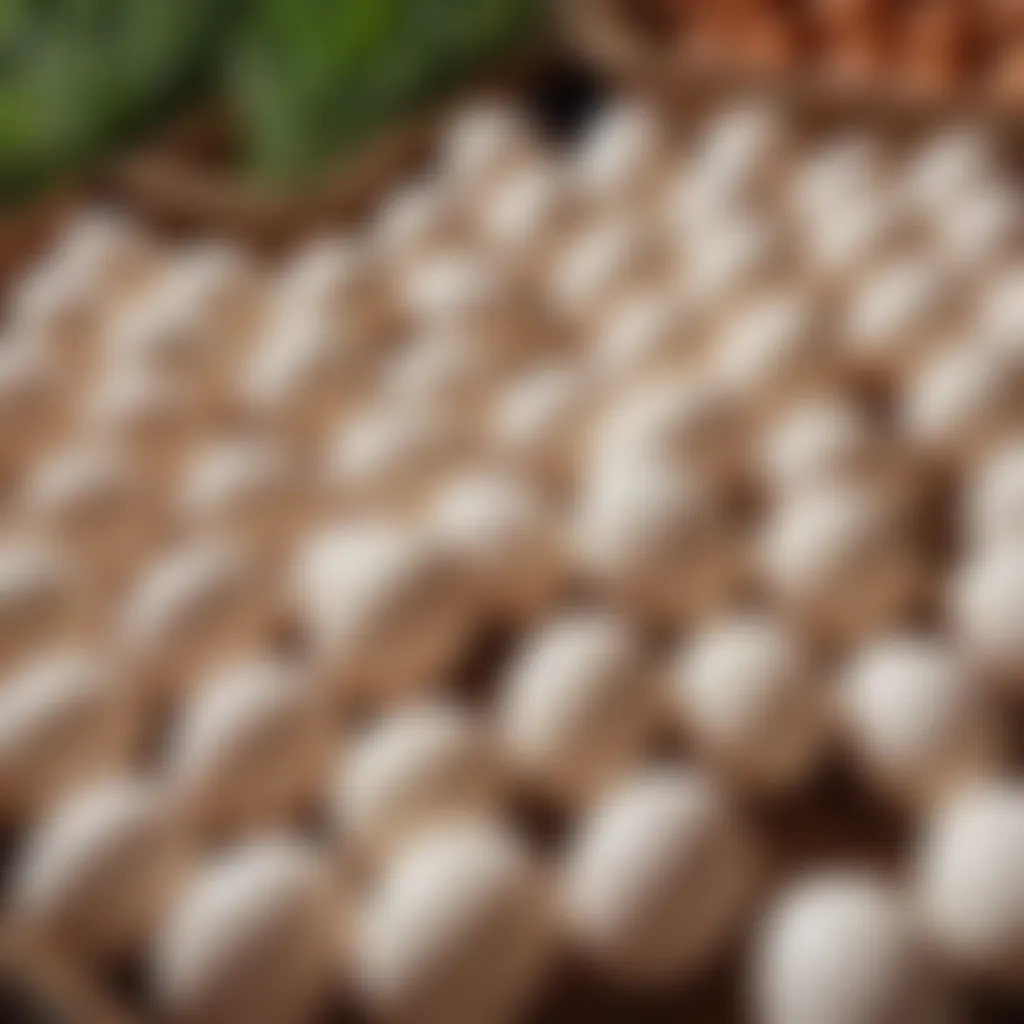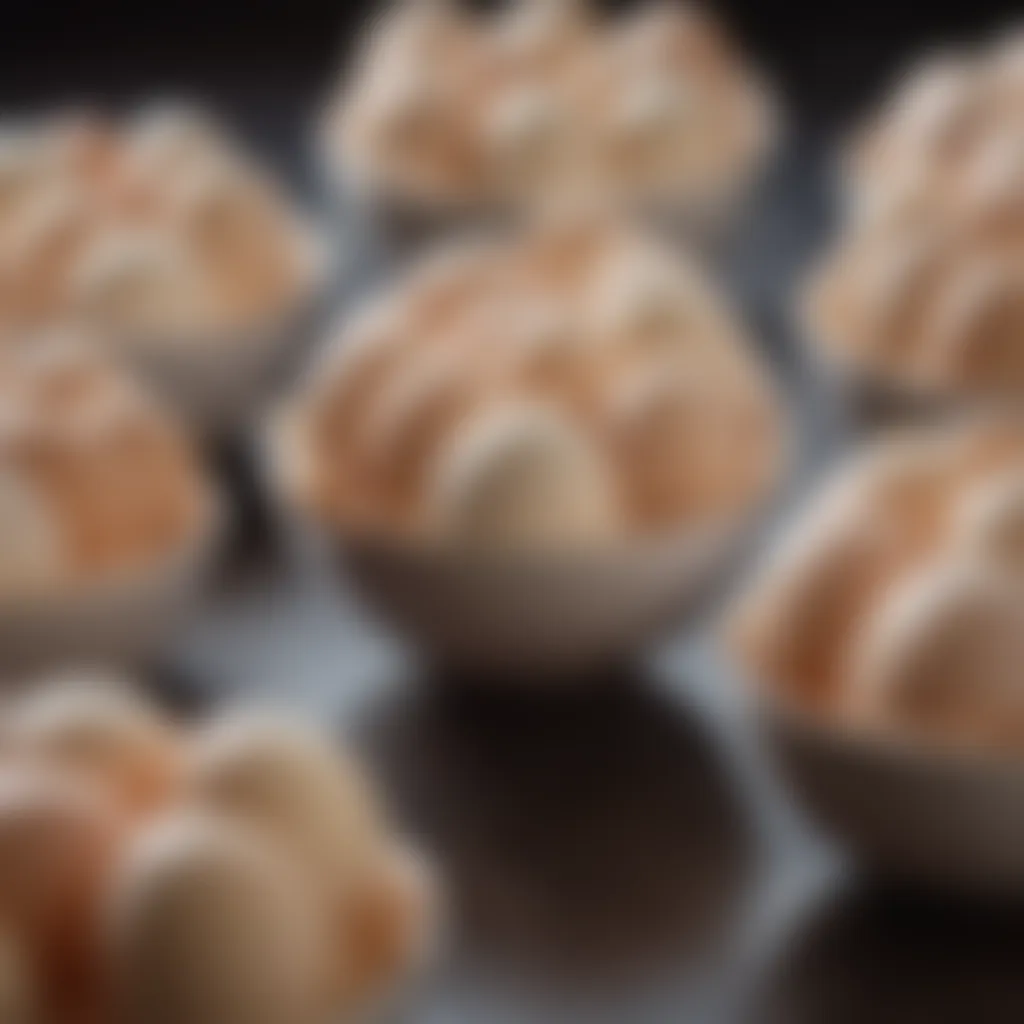Where to Find Quality Duck Eggs: A Comprehensive Guide


Intro
In the culinary world, duck eggs hold a unique place due to their rich flavor and distinct texture. They appeal to a diverse audience, from adventurous home cooks to professional chefs pursuing gourmet dishes. However, sourcing duck eggs can be a task that many find daunting.
The good news is that duck eggs are becoming increasingly accessible. With the rise of local farms, niche markets, and the conveniences of online shopping, there are several pathways to obtaining these coveted eggs. Understanding the differences between duck eggs and chicken eggs—along with the benefits they offer—will aid consumers in making informed choices. This article serves as a guide to navigate the various sources available, helping you integrate duck eggs into your kitchen.
Ingredients:
When diving into a recipe featuring duck eggs, it is essential to first gather the appropriate ingredients. Here is a clear itemized list of what you may need:
- Duck Eggs: - 6 large eggs
- Salt: - 1 teaspoon (adjust based on taste)
- Pepper: - 1/2 teaspoon (for seasoning)
- Unsalted Butter: - 2 tablespoons (for cooking)
- Fresh Herbs: - 1 tablespoon (optional, like chives or parsley)
- Cheese: - 1/2 cup (optional, shredded cheese for enhancement)
You may also consider adding specific ingredients based on culinary preferences, such as vegetables or spices, depending on the recipe or dish desired.
Preparation Steps:
- Prepare the Ingredients:
- Crack the Duck Eggs:
- Whisk:
- Ensure your dates on eggs verificted and all necessary condiments ready for use.
- Gently tap the eggs against a mixing bowl. Use care as duck eggs tend to be thicker-shelled than chicken eggs.
- Whisk the eggs visibly, adding salt and pepper. Whisking well will introduce air into the mixture, providing fluffiness.
Technical Aspects:
To get the best result while cooking with duck eggs, be mindful of the following technical specifics:
- Cooking Temperature: - For frying the eggs, maintain a medium heat (around 325°F).
- Timing: - Duck eggs generally take a little longer to cook than chicken eggs. Typically a 5 to 7 minutes frying duration is needed for eyes, depending on required doneness.
- Critical Techniques: - If sunny side up is desired, cover the pan to cook the whites thoroughly without burning the yolk.
Cooking Process:
Get ready to engage the artistry within in the kitchen! Here’s how to bring it all together in a simple yet effective manner:
- Heat the Butter:
- Add Eggs to the Skillet:
- Cook Repeatedly Checking Doneness:
- Season:
- Finishing Touches:
- In a reputable non-stick skillet, melt butter on medium heat until bubbling but not browned.
- Pour the egg mixture gentle in the skillet, avoiding any aggressive movements
- After a minute, stop and eyeball the eggs. If tending to the unknown, do frequent checks every so often.
- Sprinkle more salt and pepper if desired at behest; acknowledge personal tastes.
- If desired, fold in chopped herbs and cheese just prior serving for a flavor boost.
Troubleshooting Tips:
In the essence of culinary endeavors, know that challenges may arise. Here are solutions for common mistakes:
- If eggs burn, consider reducing the pan heat.
- If eggs fail to fluff, increase washing energy next time or continue adding air when whisking.
- Lastly, an unexpected foul smell from yolks might indicate they were not fresh, thus necessitating checking backs on the source next purchase.
Duck eggs can elevate basic recipes into gourmet delicacies, enhancing the overall taste and experience for those who explore.
Navigating the options for acquiring duck eggs, whether through local farms or online avenues, can be rewarding. This guide aims to bring clarity to the process and help housewifes appreciate the comprehensive culinary realm that duck eggs symbolize.
Prelude to Duck Eggs
Understanding duck eggs is essential for consumers who seek nutritious alternatives in their diets. These eggs have gained popularity for distinct flavor profiles and unique culinary applications. Additionally, they are notably rich in nutrition, which sets them apart from chicken eggs. As this article unfolds, we will delve into the specific attributes of duck eggs, their benefits, and various factors to consider when exploring their availability.


Understanding Duck Eggs
Duck eggs come from several breeds of ducks, each having its own characteristics. They are generally larger than chicken eggs, with thicker shells that can vary in color. The taste of duck eggs can be described as richer and creamier than that of chicken eggs, which makes them a favorable choice for soufflés and custards.
In terms of texture, duck eggs boast a firmer white and a larger yolk. This consistency can enhance many recipes where eggs act as a stabilizer or binder. Understanding these qualities is helpful when choosing duck eggs for specific culinary purposes.
Nutritional Profile of Duck Eggs
The nutritional profile of duck eggs presents a compelling reason to include them in one's diet. Smaller ducks incompatibly lay yolks filled with an array of vitamins and minerals. For instance, one duck egg can contain approximately:
- 9 grams of protein
- 6 grams of fat, mainly healthy fats
- Significant amounts of omega-3 fatty acids
- Higher vitamin A than chicken eggs
- Folate, potassium, and phosphorus.
These nutritional aspects are especially beneficial for individuals seeking to improve their intake of essential fatty acids and proteins. As housewives and cooks browse dietary options, duck eggs often provide a more robust and balanced alternative to the standard chicken egg.
Benefits of Choosing Duck Eggs
Duck eggs offer distinct advantages, making them a compelling choice for many home chefs and health-conscious consumers. Their unique flavor profile, combined with superior nutritional benefits, sets them apart from traditional chicken eggs. Choosing duck eggs can elevate culinary creations and contribute positively to health.
Health Benefits
Duck eggs are nutrient-dense, containing higher amounts of vitamins and minerals compared to chicken eggs. They are known for their rich omega-3 fatty acids, which are essential for heart health. Additionally, they have a slightly elevated protein content, aiding in muscle repair and growth. For those with egg allergies, duck eggs may also be a viable alternative since some individuals can tolerate them better than chicken eggs.
Studies have shown that the saturated fat content and the presence of high levels of vitamin D in duck eggs serve beneficial roles in maintaining overall well-being. The choline content supports brain health, which is particularly essential for pregnant individuals and developing children.
Duck eggs also have a strong yolk, which is high in pigment. This not only impacts flavor but adds a brightness and richness to dishes, making them particularly appealing for visual presentation.
Culinary Applications
Duck eggs lend themselves beautifully to various culinary applications. They typically have a larger yolk and a thicker shell, contributing to both richness and resilience during cooking. Here are some common uses:
- Baking: Duck eggs can be excellent for baking, adding moisture and creating fluffier textures in cakes and muffins.
- Custards and Ice Cream: The creaminess and flavor overworldly complements dishes that require a dulcet component, such as custards or homemade ice cream.
- Fritters and Scrambles: They achieve a rich and silky texture when scrambled or incorporated in fritters, elevating your breakfast experience.
- Chemistry with Ingredients: Their higher protein content creates better emulsions for dressings and sauces, making them a choice worth considering.
Furthermore, duck eggs are versatile across sweet and savory dishes, providing chefs and homemakers with substantial creative opportunity within their culinary repertoire. Collectively, these characteristics demonstrate the unique properties of duck eggs and encourage readers to incorporate them into their kitchen routines for both health and flavor.
Where to Buy Duck Eggs
Duck eggs offer unique culinary advantages, but locating them can be tricky. Understanding where to buy them is crucial for those interested in integrating this food item into their diet. The quest for duck eggs leads us through local farms, bustling farmers markets, and even online avenues. Each option has its unique benefits and considerations, making it imperative to explore all methodology to find these nutrient-dense eggs.
Local Farms
Visiting local farms is one of the prime ways to acquire fresh duck eggs. Often, these farms raise ducks in free-range or sustainable environments, which leads to superior quality products. Many farms offer direct purchasing options, allowing customers to witness their farming practices firsthand. This transparency builds trust between consumers and producers, and helps in understanding what’s in the food. By supporting local enterprises, you also contribute to your community’s economy.
It’s advisable to check farm directories or local agricultural organizations to find nearby establishments. Direct communication with farmers can result in fresh supplies and sometimes even better pricing.
Farmers Markets
Farmers markets serve as community hubs where artisans and farmers sell local produce. At these markets, customers are likely to find a variety of seasoned producers offering duck eggs. Duck eggs available in these venues tend to be hormone-free and often organic, fulfilling the demand for quality food among health-conscious shoppers.
Shopping at farmers markets also provides an opportunity for consumers to interact with producers. It's an excellent chance to ask questions about raising practices, feed, and any other concerns one may have related to pricing or quality. Many markets retain a seasonal nature, with duck eggs offered primarily in spring and summer, so plan visits accordingly.
Online Vendors
In today's digital age, acquiring duck eggs online has become highly accessible. Numerous vendors with online platforms specialize in artisanal foods, such as duck eggs, delivering them straight to your door. Some popular retailers include FreshDirect, Farmgelic, and various Etsy shops where individuals offer curated products.
When ordering online, it’s critical to consider shipping methods. Eggs are sensitive to temperature changes, so choose vendors who ensure safe and carefully packaged deliveries. Additionally, researching vendor reviews can provide insight on quality and reliability. Always check local regulations email regarding shipping eggs, as rules may vary.
Specialty Grocery Stores
Specialty grocery stores, such as Whole Foods or local organic markets, frequently carry duck eggs. These stores cater to a growing population interested in higher quality nutritional options. Often, they stock eggs from trusted suppliers who specialize in a variety of poultry products.


However, availability can vary by location, so it is recommended to call ahead. Speak with staff or conduct a quick visit to see if they stock duck eggs or can order them on request. Often, these stores provide other duck-based products like duck jerky or smoked duck, showcasing the versatility of this ingredient.
Research well to discover which type of store offers the best local selection and pricing for duck eggs.
In summary, various channels exist to procure duck eggs, ranging from local farms to online vendors. Each option has distinct advantages and pricing strategies, enhancing the chance that you can introduce this unique food into your kitchen effectively.
Considerations for Purchasing Duck Eggs
When you decide to purchase duck eggs, it’s essential to consider several factors to ensure an informed choice. Duck eggs can differ vastly from chicken eggs in terms of taste, texture, and nutritional value. This proper understanding will lead to a more satisfying purchasing experience and help you make informed choices depending on your needs and preferences.
Freshness and Quality
Freshness and quality are paramount when buying duck eggs, as these factors drastically affect flavor and safety. Eggs sitting too long may spoil or develop an off-taste. It's advisable to inspect the eggs yourself; they should be clean and free from cracks or signs of damage. Holding the egg to the light can be a good practice to determine if the egg is fresh. As eggs age, air seeps inside, causing the egg to float. A floating egg usually indicates that it is no longer fresh.
Moreover, consider purchasing from farms known for optimal care conditions. Healthy ducks lay healthier eggs, and conditions like temperature and feed quality impact the egg's properties. Check with farmers for operational practices regarding their duck flocks.
Organic vs.
Conventional
The choice between organic and conventional duck eggs can influence taste and nutritional value. Organic duck eggs typically come from farms that adhere to specific agricultural standards. These farms use organic feed, do not use synthetic pesticide or antibiotics, and provide ducks with healthier living conditions in most cases. Consumers often report that organic eggs provide richer flavors and have superior texture.
However, conventional duck eggs may still offer good value and quality. Look for certifications that affirm the product's quality, such as those from the United States Department of Agriculture (USDA).
It's wise to weigh your priorities. Is your main concern origin, assurance of higher animal welfare, or just getting good value? Understanding these factors will shape your purchasing decision.
Pricing Fluctuations
Purchasing duck eggs can show significant pricing fluctuations, primarily influenced by seasonal factors and regional demand. Typically, prices can range based on local markets, especially between local farms and farmers' markets. It's best to compare different vendor prices. Some directly selling farmers might offer deals throughout the harvest seasons, especially when supply exceeds demand, like during peak laying seasons in spring
When sourcing online, increased shipping can sometimes affect total prices too, making it essential to calculate final costs beforehand. Insight into price trends might help plan your purchases. Moreover, larger quantities may provide bulk discounts, futhier affecting registration decisions.
In summary, comprehending these considerations is essential for making informed choices while purchasing duck eggs. Assessing freshness and quality, selecting between organic or conventional, and being aware of price fluctuation help in optimizing your buying experience, ensuring you enjoy this premium offering in the best quality likely obtainable.
Duck Egg Regulations
Food Safety Standards
When it comes to food production, safety is paramount. Duck eggs, like all edible products, must meet certain safety standards to ensure consumer health. The Centers for Disease Control and Prevention (CDC) and the Food and Drug Administration (FDA) play significant roles in establishing guidelines on the safe handling, storage, and transporting of these eggs. Since duck eggs are more prone to possible contamination, the regulations focus on prevention methods, such as washing eggs to remove potential pathogens on the shell.
Each farm producing duck eggs is responsible for its compliance with these adaptations. Farmers need to know sanitation practices, especially at critical stages like collection. This includes handling eggs with clean hands and ensuring that their laying hens are cared for properly. Those standards not only serve to protect consumers but also enhance the credibility of producers.
To summarize, understanding food safety for duck eggs involves:
- Regular cleaning of production equipment
- Training of workers in safe handling practices
- Monitoring foodborne illnesses that could impact production
Such measures lead to increased consumer confidence, which in turn fosters sustainable markets.
Labeling Requirements
Labeling is a crucial aspect that ties back to customer trust and safety awareness. Duck egg labels must provide clear information about what is being offered. The Food Safety and Inspection Service (FSIS) documents some essential requirements relevant to egg producers. This includes specifics like the storage conditions of the product and best before dates.
Egg cartons should bear details on their origin. These labels empower customers to make informed choices regarding the quality and type of eggs they are about to purchase. Informed choices not only benefit consumers but bolster ethical farming practices. Clear labeling can prevent misleading situations similar to common issues that can arise in poultry market.
Key components typicall included in labeling are:
- Farm’s name and address
- Safe handling instructions
- Nutritional facts
With electricity and resources available today, increasing transparency is both achievable and vital for sustaining consumer relationships, encouraging more individuals to opt for duck eggs.


Duck Egg Varieties
Understanding the different varieties of duck eggs is vital to make informed purchases and enjoy various cooking experiences. Duck eggs come from several breeds, each contributing unique characteristics. The breeds also impact flavor, culinary uses, and nutritional content.
Different Duck Breeds
Duck eggs primarily come from several breeds such as the Pekin, Khaki Campbell, and Muscovy. Each breed has its own nuances:
- Pekin: Known for its prolific egg-laying, Pekin ducks produce large, white eggs with a mild flavor. These eggs are popular in Asian cuisines for frying and steaming dishes.
- Khaki Campbell: This breed is exceptionally prolific and produces many eggs. Their eggs are medium-sized, often with a unique brown tint. They tend to be richer in taste, making them ideal for baking and custards.
- Muscovy: This breed provides a distinct taste. Its eggs are somewhat larger and sit closer to an off-white color. Muscovy eggs are often praised for their richness, making them suitable for hearty dishes such as quiche and frittatas.
Each of these breeds not only offers variety in flavor and cooking applications but generally speaks to the diverse culinary landscape of duck egg consumption. Understanding these breeds helps consumers cater their choices to specific recipes or preferences.
Color and Size Differences
Duck eggs vary noticeably in color and size across breeds. The colors can range from pale blue to deep brown while the sizes can significantly differ. For instance:
- Color Range: At first glance, different duck eggs look widely various due to their shades.
- Size Variations: Duck eggs are generally larger than chicken eggs, but among different breeds, their sizes can be distinct but vary considerably. Pekin eggs tend to be larger, while Muscovy eggs can often surpass those in dimensions and weight.
- Pekin ducks provide almost completely white eggs.
- Khaki Campbells may offer darker brown eggs.
- A Muscovy egg can veer towards a greenish tinge.
This extensive range in size and color is not merely aesthetically pleasing; it can influence cooking outcomes as well. Larger eggs often yield different results in baking, while color differences might affect presentation.
Understanding these varieties allows consumers to select duck eggs with intent, paying close attention to how they plan to use them in various dishes. Considerations like flavor profile and culinary attributes turn the sourcing of duck eggs into a thoughtful decision-making process that elevates the cooking experience.
Storing and Cooking Duck Eggs
Understanding how to properly store and cook duck eggs enhances their flavor and prolongs their freshness. These specific actions not only ensure safety but also optimize the overall gastronomic experience when incorporating duck eggs into a diet. With their unique characteristics, knowledge about storing and cooking becomes essential to truly enjoy this niche product. Nutritionally richer than chicken eggs, duck eggs may require different considerations for optimal usage.
Best Practices for Storage
Storing duck eggs needs careful attention due to their delicate nature. Here are crucial tips to keep their quality intact:
- Temperature control: Duck eggs should be stored in the refrigerator at a temperature between 32 and 40 degrees Fahrenheit. This minimizes spoiling and maximizes freshness.
- Positioning: Keep duck eggs in their original carton. This helps prevent the eggs from absorbing odors from other foods in the fridge.
- Check for cracks: Always inspect for any cracks before storing. A cracked egg can lead to faster spoilage and could contaminate other eggs.
To estimate freshness, candidates can perform a water test. Fresh duck eggs sink in water, while older eggs float due to air-filled pores.
Cooking Techniques
Cooking duck eggs properly is nearly an art form that showcases their exceptional flavors. Adapting traditional chicken egg recipes will often not yield the same experience. Here are some key techniques when cooking:
- Boiling: Hard-boiling duck eggs should be done for 10-12 minutes to achieve maximum cook. The yellows might appear darker and richer than typical chicken eggs, bringing a visually appealing contrast.
- Frying: When frying, remember to use gentle heat. The egg white tends to become firmer compared to chicken eggs. Season simply to allow the deep flavor to emerge.
- Scrambling: When scrambling, incorporate a little cream or butter for a smoother texture. Their richness allows integration of stronger flavors like herbs and spices.
End
By focusing on proper storage and mastering a few cooking techniques, one can elevate duck eggs from mere grocery items to centerpiece ingredients worthy of delight. Explore their usage in various dishes to discover a broader palette of flavors.
Finale
The significance of the conclusion in this article revolves around several specific elements concerning the sourcing and enjoyment of duck eggs. By summarizing the key points covered, we not only reinforce the value of this unique culinary ingredient but also enhance understanding for the reader. A well-rounded overview may highlight where duck eggs can be found, the benefits they offer, and what to consider before purchasing.
A clear conclusion ties together insights related to local farms, farmers markets, and online vendors, emphasizing that knowing where to buy is just the start. Readers will appreciate guidance regarding freshness, quality, and pricing. These are direct factors that influence decisions, especially for those who seek healthy, delicious alternatives in their cooking.
Moreover, it is essential to recognize that duck eggs are not merely substitutes for chicken eggs. Their distinct flavor, higher fat content, and unique nutritional profile offer a different cooking experience, likely bringing new textures to familiar dishes. As such, informed sources and proper storage techniques can maximize the culinary potential they hold.
In summarizing the entire framework, the conclusion serves as reassurance for those attempting to navigate the sometimes-confusing food landscape. Additionally, it paves the way for more adventurous cooking and meaningful culinary enjoyment. Keeping these aspects in mind while addressing the key points discussed throughout this article gives a solid understanding, empowering the reader to make informed decisions about their fondness for duck eggs.
Final Thoughts on Duck Egg Sourcing
In closing, duck eggs have numerous benefits, from enhanced taste to valuable nutrients. Sourcing duck eggs can seem daunting initially, but this guide facilitates a clearer path.
When sourcing duck eggs, several factors come into play:
- Freshness: Ensures highest quality and flavor.
- Seasonal availability: Awareness of peak seasons supporting sustainable sourcing.
- Reputation of sources: A reliable vendor is crucial for quality.
Don’t hesitate to explore local recommendations from your community, discover unique breeds, or try various cooking methods to appreciate this multifaceted ingredient fully. As it becomes widely understood, the option of duck eggs will likely grow not only considered but highly sought after. Embrace this opportunity for flavor exploration in your everyday cooking.







